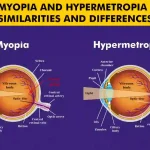Headaches are common due to frequent lack of sleep, tight headwear, wearing incorrect eyeglass prescription (or not wearing altogether), and other such reasons that can cause a heavy head feeling. However, headaches should not happen in a recurring manner. Intense and frequent headaches are termed migraines, a neurological condition that can cause a sense of spinning and intense dizziness. As per reports, migraine is the third most prevalent illness in the world.
Ocular migraine, a form of migraine, is a rare condition that can cause temporary blindness in one eye for a duration that lasts less than an hour. The feeling of temporary blindness normally happens before or after an intense migraine headache.
Ocular migraine differs from a normal migraine attack where you temporarily experience blind spots in both eyes. What are the major causes of ocular migraine? How can you get yourself treated for the same?
In this blog, we answer all the questions related to an ocular migraine.
Ocular Migraine – More than a headache
An ocular migraine (also referred to as visual migraine or migraine with aura) is a rare condition caused by decreased blood flow in the retina or behind the affected eye. There are two major differences between a visual migraine and ocular migraine:
- Visual migraine occurs in both the eyes whereas ocular migraine occurs only in one eye
- Visual migraine causes severe headache whereas ocular migraine causes temporary blindness in one eye and may not be associated with headache
Let’s take a closer look at the causes, symptoms and treatment of ocular migraine.
Causes of Ocular Migraine
There are two major causes of ocular migraine:
- Spasms in the blood vessels in the retina.
- Changes in the nerve cells across the retina
You should look out for common triggers that cause migraines. It could either be related to certain categories of food (e.g. cheese, caffeinated drinks, etc.) or certain additives of food like artificial sweeteners, Monosodium Glutamate, etc.
Though the after-effects of ocular migraine last less than an hour, it is recommended to visit a doctor and discuss the ocular migraine symptoms and treatments if you are having regular headaches followed by blind spots.
Symptoms of Ocular Migraine
You should look out for temporary vision problems whenever you witness an ocular migraine attack. After half an hour or so, cover the non-impacted eye to check if the vision has been retained in the affected eye.
Here are the other ocular migraine symptoms that you should be looking for when experiencing a headache:
- Constant headache (affecting only one side of the head) that lasts close to 24 to 72 hours
- Frequent dizziness in the head
- Constant vomiting sensation
- Nausea
- Sensitiveness to light and/or sound
If you witness any of these ocular migraine symptoms, revisit your sleeping patterns and emotional stress levels since they can trigger frequent migraine attacks.
Treatment of Ocular Migraine
As ocular migraine temporarily affects vision in one eye, it is recommended to not perform activities like driving, cooking, working on computers, etc. Relax till the time your sight does not return to normal.
Apart from this, here are a few things that can help with the treatment of Ocular Migraine:
- Consume a pain reliever recommended by your doctor
- Avoid consuming food that acts as potential triggers of migraine
- Consume healthy food on a timely basis
- Try stress-buster activities like yoga or massage
- Take plenty of sleep
Visit your doctor to take inputs on how you can get treatment for Ocular Migraine.
Centre for Sight has experts that can help in treating ocular migraine as well as visual migraine. As ocular migraine affects visual activities, it is recommended to take assistance from doctors in the Centre for Sight that have immense experience in treating all types of problems associated with the eyes.
Article: All You Need To Know About Ocular Migraine
Author: CFS Editorial Team | Feb 09, 2021 | UPDATED 03:19 IST
*The views expressed here are solely those of the author in his private capacity and do not in any way represent the views of Centre for Sight.





